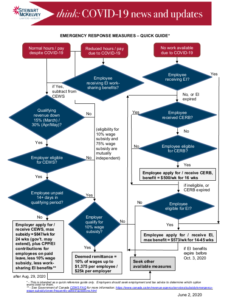Taking stock: Quick reference guide for government initiatives
*Flowchart below last updated June 2, 2020 (Originally published April 14, 2020)
With the passing of Bill C-14, the COVID-19 Emergency Response Act, No. 2 on April 11, 2020, the federal government has now laid a legislative foundation for various initiatives to assist employers and employees who are affected by COVID-19. The main measures include:
- The new Canada Emergency Response Benefit (“CERB”)
- The new Canada Emergency Wage Subsidy (“CEWS”), a 75% wage subsidy for eligible employers for the 12-week period beginning March 15, 2020
- The new 10% Temporary Wage Subsidy for employers
- Enhanced access to Employment Insurance (“EI”) benefits, including streamlining applications to the EI work-sharing program
Details on emergency response measures have shifted over the past few weeks, as they have evolved in response to our ever-changing situation. We expect this evolution will continue in many respects; notably, we are still awaiting regulations to further clarify some details related to CERB and CEWS.
However, given that the legislation now appears to be place, it seems an opportune moment for a fresh look at the current landscape of options. Recognizing it is a busy time, it is our pleasure to provide a dynamic summary of the mutual interactions between CERB, CEWS, EI and the 10% wage subsidy. We trust this will serve as a helpful reference point when seeking employment and tax advice to find the best options in the circumstances.
*Link to printable PDF version here.
This article is provided for general information only. If you have any questions about the above, please contact a member of our Labour and Employment group.
Click here to subscribe to Stewart McKelvey Thought Leadership articles and updates.
Archive
In Wood v. Wood et al, 2013 PESC 11, a motion pursuant to Rule 7.08 of the Rules of Civil Procedure for court approval of a settlement involving a minor, Mr. Justice John K. Mitchell approved the settlement among the…
Read MoreClients who sit on boards of corporate employers should take note of recent amendments made to New Brunswick’s Employment Standards Act (the “ESA”) which could increase their exposure to personal liability in connection with claims advanced by…
Read MoreSignificant changes may be coming to the standard automobile policy in PEI, including increases to the accident benefits available under Section B and an increase to the so-called “cap” applicable to claims for minor personal…
Read MoreOn June 17, 2013, pursuant to the recently amended Section 70 of the Labour Relations Act for Newfoundland and Labrador (“NL”), the Government of Newfoundland and Labrador issued three Special Project Orders (“SPOs”) in respect of the…
Read MoreOn June 14, 2013, the Supreme Court of Canada (“the Court”) released the decision that employers across the country were waiting for. In CEP Local 30 v. Irving Pulp & Paper Ltd., 2013 SCC 34, a…
Read MoreThe Government of Newfoundland and Labrador (“NL”) has recently released its “Aboriginal Consultation Policy on Land and Resource Development Decisions” (the “Policy”). A copy of the Policy can be accessed here. This new Policy is the…
Read MoreThe following is a province-by-province update of legislation from a busy 2013 spring session in Atlantic Canada. Watching these developments, we know the new legislation that has passed or could soon pass, will impact our…
Read MoreThe integrity of the jury system has become a pressing topic for our courts of late, with articles about jury duty frequently appearing front and centre in the press. The recent message from the Nova…
Read MoreIN THIS ISSUE: Cloud computing: House to navigate risky skies by Daniela Bassan and Michelle Chai Growing a startup by Clarence Bennett, Twila Reid and Nicholas Russon Knowing the lay of the land – Aboriginal rights and land claims in Labrador by Colm St. Roch Seviour and Steve Scruton Download…
Read MoreDOES IT APPLY TO YOU? On June 1, 2013, the Personal Health Information Act (PHIA) comes into force in Nova Scotia. If you are involved in health care in Nova Scotia, you need to know whether PHIA…
Read More
